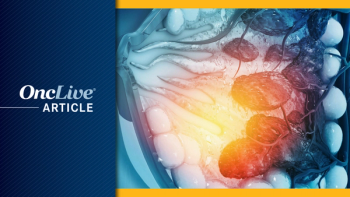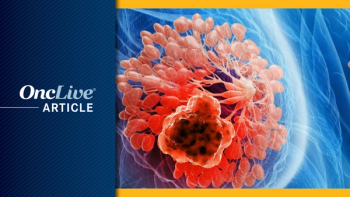
SY-5609 Under Investigation With Atezolizumab in Colorectal Cancer Subsets
The highly selective and potent CDK7 inhibitor SY-5609 is being tested in combination with atezolizumab in patients with molecularly defined subsets of colorectal cancer, as one of the cohorts of the ongoing, phase 1/1b INTRINSIC trial.
The highly selective and potent CDK7 inhibitor SY-5609 is being tested in combination with atezolizumab (Tecentriq) in patients with molecularly defined subsets of colorectal cancer (CRC), as one of the cohorts of the ongoing, phase 1/1b INTRINSIC trial, according to Syros Pharmaceuticals, the developer of SY-5609.1
The SY-5609/atezolizumab regimen will be studied in a combination dosing cohort of the study, which is exploring the efficacy, safety, and tolerability with various targeted agents and immunotherapies alone or in combination for select patients with CRC. The combination is part of a clinical supply agreement with Roche, which manufactures the PD-L1 inhibitor.
"We are pleased that Roche has chosen to study SY-5609 as part of its broader strategy to explore atezolizumab in combination with other targeted agents in defined colorectal cancer patient populations," said Nancy Simonian, MD, chief executive officer of Syros. "We believe SY-5609 is a potentially transformative targeted approach for difficult-to-treat cancers. Preclinical data has shown that CDK7 inhibition enhances the anti-tumor activity of PD-L1 inhibition, providing a strong rationale for combining SY-5609 and atezolizumab.”
This will be the first study of a CDK7 inhibitor with an immunotherapy, which will be evaluated in patients with BRAF-mutant colorectal cancer, Simonian added. As part of the clinical supply agreement, Roche is sponsoring and conducting the INTRINSIC trial. Syros, which will retain all rights to SY-5609, will also be provided access to the data of the combination of SY-5609 plus atezolizumab.
Selective CDK7 inhibition has demonstrated the ability to target transcription and cell cycle control in cancer, and CDK7 inhibition also induces DNA replication stress and genome instability in preclinical models, which causes immune-response signaling.
Preclinical findings of SY-5609 in CRC were presented during the 2020 ASCO Virtual Scientific Program.2 Investigators studied the in vitro cellular assays’ pharmacokinetics (PK), pharmacodynamics (PD), and tumor growth inhibition (TGI) relationship; and patient-derived xenograft CRC models. Data showed that SY-5609 potential inhibits proliferation and inducts G2/M arrest in KRAS- and BRAF-mutant CRC cell lines in vitro.
Additionally, once-daily dosing of SY-5609 led to a 50% or higher TGI in 67% of CRC patient-derived xenograft models (n = 20/30) and at least 90% in 23% (n = 7/30) at well-tolerated doses. This included all models derived from heavily pretreated patients.
In BRAF-mutant models, the response rate was 50% (n = 5/10); this was 10% in KRAS-mutant or wild-type models (n = 1/10). Tumor regressions were noted in 2 BRAF-mutant models and 1 KRAS-mutant model.
SY-5609 is also being tested in an ongoing, multicenter, open-label, phase 1 dose-escalation trial (NCT04247126) in patients with advanced cancers of the breast, colon/rectum, lung, ovaries, or pancreas; those with solid tumors of any histology harboring Rb pathway alterations are also permitted.3 To be eligible for enrollment, patients must have at least 1 measurable lesion by RECIST v1.1 criteria, have cancer for which curative or palliative methods are not effective or exist, an ECOG performance status of 0 or 1, a life expectancy longer than 3 months, and resolution of all toxicities to less than grade 1 prior to study enrollment.
Treatment is given orally once-daily in 4-week cycles. Patients are initially enrolled onto single-patient accelerated titration cohorts, followed by cohorts in a 3+3 design. After evaluation of dose-limiting toxicities are completed, more patients can enroll at that dose to get a deeper understanding of PK and PD, as well as clinical activity. Circulating tumor DNA is collected at 2 timepoints during the trial, and fresh tumor biopsies may also be collected for molecular analyses.
Initial findings of the trial, which opened in January 2020, highlighted the proof of mechanism at tolerable doses, the company stated. Additional findings from this phase 1 trial are expected to be presented at the 2021 ESMO Virtual Congress; the expansion portion of the trial is planned to start later in 2021.
References
- Syros Announces Agreement with Roche to Evaluate SY-5609 as Part of a Novel Combination for Treatment of Colorectal Cancer. News release. Syros Pharmaceuticals. August 5, 2021. Accessed August 18, 2021.
https://yhoo.it/37U079M - Johannessen L, Ke N, Sawant P, et al. Activity of SY-5609, an oral, noncovalent, potent, and selective CDK7 inhibitor, in preclinical models of colorectal cancer. J Clin Oncol. 2020;38(suppl; abstr 3585). doi:10.1200/JCO.2020.38.15_suppl.3585
- Papadopoulos KP, Sharma M, Hamilton EP, et al. First-in-human phase I study of SY-5609, an oral, potent, and selective noncovalent CDK7 inhibitor, in adult patients with select advanced solid tumors. J Clin Oncol. 2020;38(suppl; abstr TPS3662). doi:10.1200/JCO.2020.38.15_suppl.TPS3662

























































































